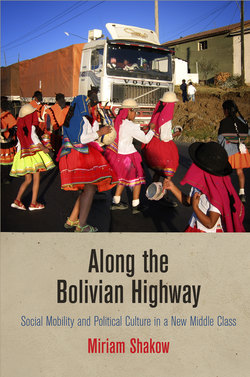Along the Bolivian Highway

Реклама. ООО «ЛитРес», ИНН: 7719571260.
Оглавление
Miriam Shakow. Along the Bolivian Highway
Отрывок из книги
Along the Bolivian Highway
Kirin Narayan and Alma Gottlieb, Series Editors
.....
Self-interest, like collective interest, is a central human motivation. When MAS leaders and development workers perceived that their attempts at political transformation had failed, they often blamed citizens’ moral failure. MAS leaders expressed disappointment when citizens were unable, in their view, to properly assume an attitude of public-mindedness over private interest. Such language of blame ignores both the structural constraints on Bolivians’ realizing their own middle-class aspirations and the practical ways in which individuals drew on multiple frameworks in participating in public life. These observations lead me, like Ernesto Laclau (1992:9), to argue that self-interest and individual interest often blur in political practice, despite the widespread assumption in political theory that we can analytically distinguish between the two (see also Seligman 1992).
In practice, many Sacabans described their hopes for the future in ways that combined individual middle-class aspirations, collective prosperity for indigenous and poor Bolivians, and the uplift of Bolivia from its subordinate position in the global geopolitical community of nations. Many prosperous Sacabans who fervently supported MAS in the early years of Evo’s government described themselves as members of the historically excluded indigenous majority and therefore asserted that their individual interests were the interests of the nation.11
.....